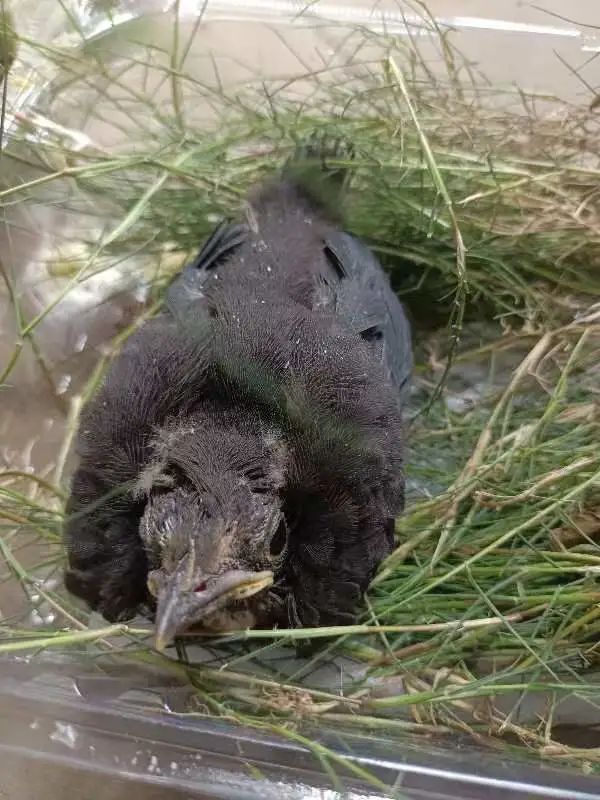On July 22, 2023, a kind-hearted citizen sought help to the China Biodiversity Conservation and Green Development Foundation (CBCGDF) volunteer, Zhou Chong, who's the head of the CBCGDF Lianyungang Conservation Area (CBCGDF-CCAfa). She had discovered a black bird chick but was unsure how to care for it as it couldn't fly and she suspected it might have fallen from its nest. Worried about the little bird's well-being, she turned to the CBCGDF volunteers for help.

After receiving communication, and checked the photos and videos of the situation, the CCAfa head identified the young bird as a Eurasian Blackbird. He explained that it was a season when many young birds were practicing flying, and he often encountered similar fledglings in his neighborhood. These young birds sometimes perched on roads without fear of humans. However, he reassured her that there was no cause for concern since the parent birds were likely nearby, keeping an eye on their young ones. Soon enough, they would learn to fly on their own. Zhou reminded citizens not to disturb the fledglings if found, as interfering could disrupt their natural development. Instead, the best course of action was to stay away, or if already pick-up them, just return them to where they were found, as the parent birds would be anxiously looking for them.
Guided by the CCAfa's patient advice, the woman took good care of the little blackbird, providing it with some water and then returned it to where it was found.
Graciously, Zhou Chong responded to her gratitude, saying, "You're welcome, and thank you for caring about wildlife. We share the same blue sky and coexist with birds in our common habitat. Let's work together to contribute to biodiversity conservation!" He firmly believed that only through collective efforts to protect wildlife and their habitats could we make our planet a better place. The story of this little blackbird also serves as a reminder that when dealing with wildlife, we should respect their natural behaviors, maintain a safe distance, and work together to safeguard this beautiful natural home we all share.
This is not the only case that the China Biodiversity Conservation and Green Development Foundation (CBCGDF) has received help message. To better help general public to understand the situation, on July 22, 2023, the "China Biodiversity Conservation and Scientific Ethical" WeChat (CBCGDF's BASE Wechat Account) released a guide titled "What to Do When You Find a Fallen Baby Bird? Five Recommendations from CBCGDF's Community Conservation Area (CCAfa)". The guide aims to provide principles for handling similar situations:

Finding a fallen baby bird is a relatively common occurrence. However, it is essential to handle it correctly to ensure the bird's safety and well-being. Here are the recommended steps:
1. Assess the necessity of intervention: First, carefully examine the baby bird to check for any visible injuries. If the bird is injured or showing signs of health issues, it is crucial to contact local wildlife conservation organizations or animal rescue agencies promptly. Adhere to the principle of "when it's not necessary, then no intervention, and no rescue". If the baby bird appears healthy and uninjured, it is likely in the process of learning to fly.
2. Look for the nest: If possible, search for the bird's nest nearby. The baby bird might have fallen while learning to fly, and the nest is usually close. Gently place the bird near the nest and then step away to avoid scaring off the parent bird.
3. Avoid interference: If you cannot find the nest or determine its location, it is best not to disturb the baby bird. In some bird species, parent birds intentionally place their young in different locations to teach them flying skills. Parent birds typically monitor and care for their offspring nearby.
4. Maintain a safe distance: If you encounter a baby bird, refrain from attempting to take it home or hand-raise it. Baby birds require specific diets and care that humans cannot adequately provide.
5. Seek professional assistance: If you are unsure about how to handle the situation or need guidance, it is recommended to promptly contact local wildlife conservation organizations, animal rescue agencies, or avian experts. They possess the experience and knowledge to offer appropriate advice and assistance.
During this post-breeding season, it is the time when young birds are eager to take flight into the blue sky. Therefore, properly handling fallen baby birds is a crucial aspect of their survival. Respecting natural laws and allowing parent birds to care for their offspring, while adhering to the principle of "when it's not necessary, then no intervention, and no rescue", is paramount. In cases where intervention is truly necessary, it is advised to contact local wildlife conservation departments or institutions (such as forestry departments, and CBCGDF's Community Conservation Areas) to seek assistance from experienced professionals, ensuring the baby birds receive appropriate help.
#BCON#
Reporter: Linda
Editor: Samantha
Contact: V10@cbcgdf.org; +8617319454776

Contribution
Do you know? CBCGDF is a non-profit organization. We rely on crowd-funding and donations. You have the opportunity to help us to advance biodiversity conservation. Donate TODAY to power up the movement to make it a better world for all life.
https://www.paypal.me/CBCGDFChina
http://www.cbcgdf.org/English/ConfirmDonaTion/0.html
